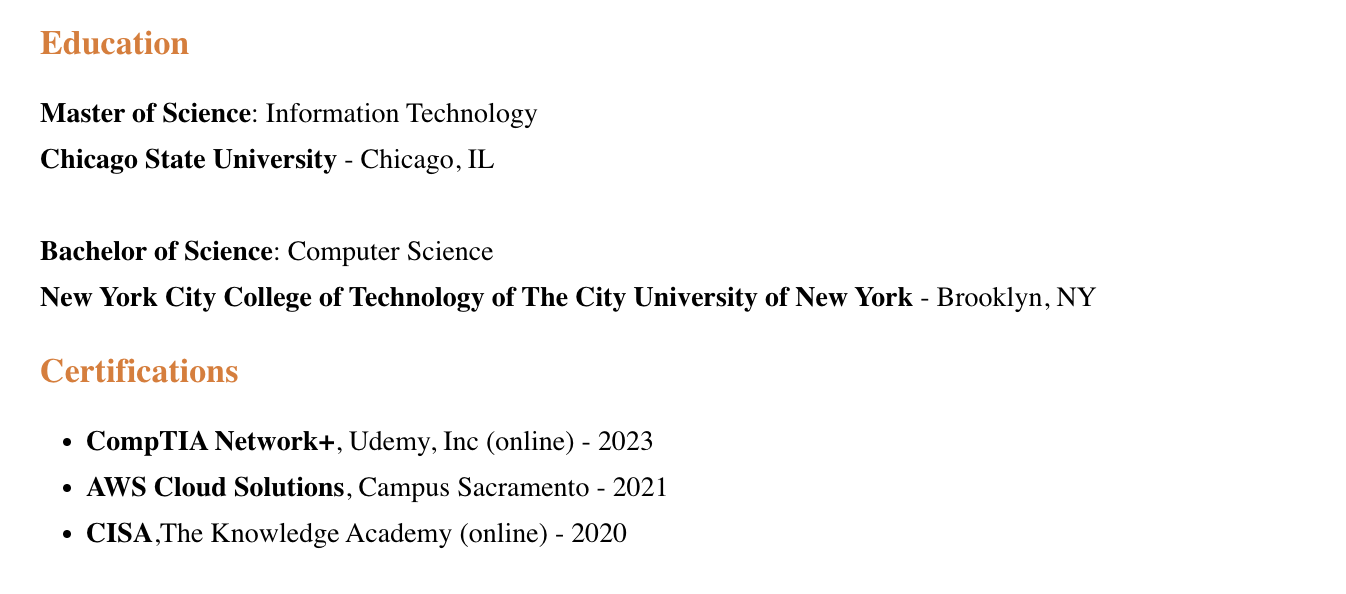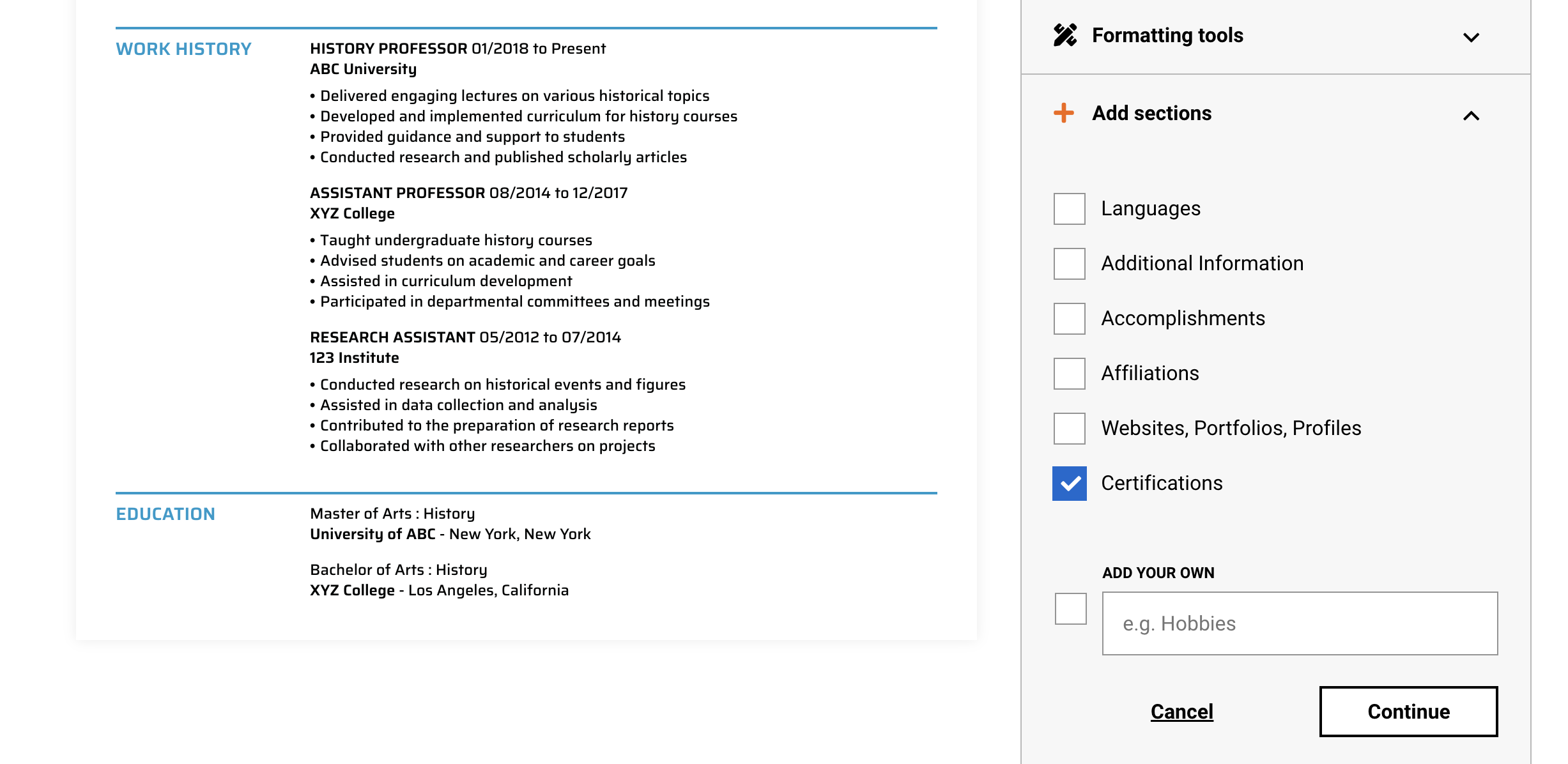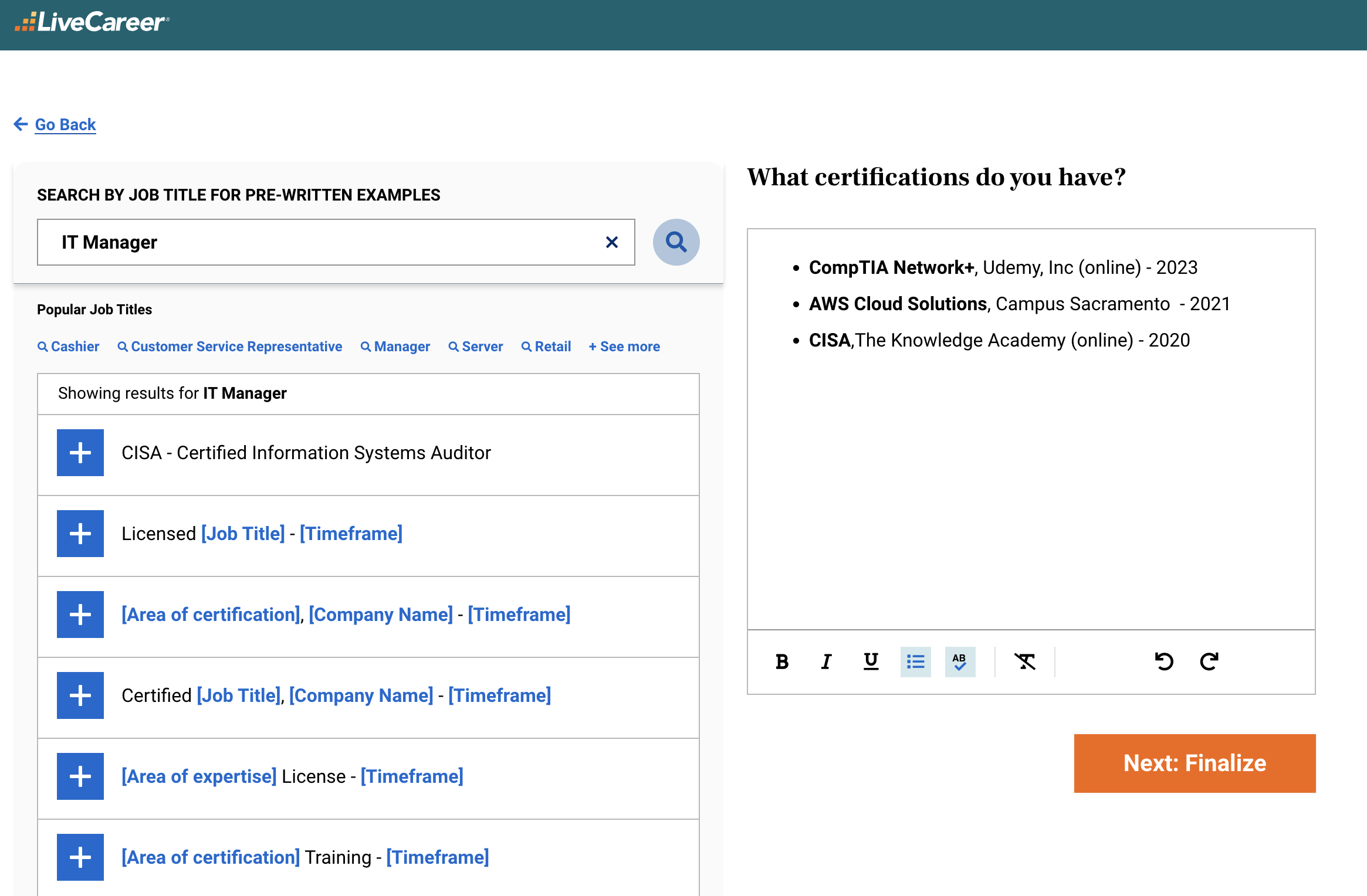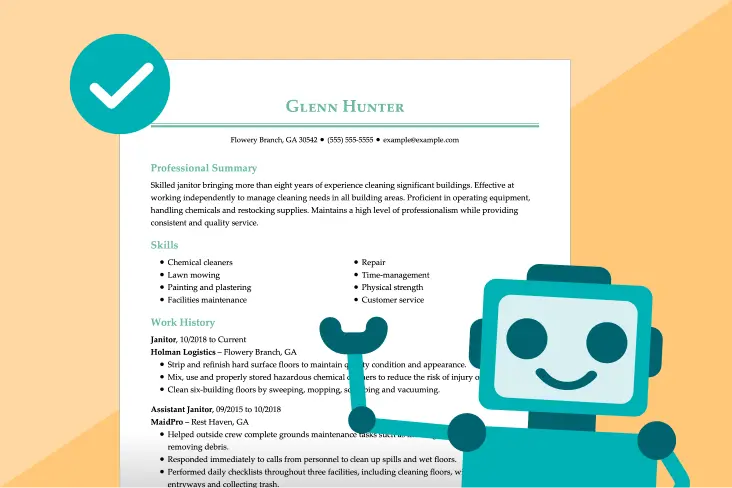How to List Certifications on a Resume Examples
Adding certifications on a resume helps validate specific skills and knowledge, demonstrating to potential employers that you have relevant expertise in your field. Here, we’ll show you how to put certifications on your resume to get noticed and win the job.
What Are Certifications?
Certifications are credentials awarded to individuals who have demonstrated competence or mastery in a specific skill, technology or field of knowledge.
Getting certifications often requires taking a class or course or passing a test.
Certifications come from schools, industry associations or other accredited institutions. The term is frequently used alongside “licenses,” which may have a legal requirement to practice.
Popular examples of certifications
Here are some common certifications that job seekers may mention on a resume. They include:
- CPR/AED: Adult First-Aid certificate that shows you have passed a class covering various safety and life-saving techniques.
- ServSafe: This certification is commonly required for restaurant workers to confirm they know the best food safety handling procedures to prevent illness.
- CDL: A commercial driver’s license proves that you’ve taken behind-the-wheel training and passed a test to safely operate various types of vehicles.
- OSHA Forklift certification: Certifies that you have passed a test to operate and maneuver forklifts safely.
- Certified Scrum Master (CSM): Project managers get this certification to prove they have the organizational skills to run digital ticketing systems.
- Certified Ethical Hacker (CEH): A respected cybersecurity certification that shows you have the technical knowledge and ability to test systems for vulnerabilities and prevent cyber attacks.
Courses vs. certifications
Remember that completing a course or class does not guarantee certification! An official printed copy of your certificate from a school, organization or group is technically required to call something a “certification.” Otherwise, you might more accurately refer to it as “Coursework and training.”
When to put certifications on a resume
Putting certifications on a resume is usually a good idea, but there are three situations when it’s a must!
1) The employer requires it.
If the employer mentions a specific certification they’d like you to have in the job post or ad, you should 100% list it in your resume. This will give you an edge over every other candidate who is unqualified or neglected to mention it.
2) To sell your skills and professional preparation.
Whenever a certification proves your depth of knowledge, expertise or readiness for a role, it will benefit you to mention it. That way, employers will see that you’re a cut above your job competition, lacking the training and commitment you have.
3) To increase your job chances when you lack direct experience.
If you have little work experience, attaining certification can help your job chances by showing your ambition, passion and hard work and that you have a solid foundational background. If your certificate was issued recently, it proves you’re up-to-date on best practices.
If any of these situations apply to you, list certifications on your resume.
Now, are you ready to get started making your resume? Get started using our Resume Builder.
When NOT to put certifications on a resume
The only time you should skip putting certifications on your resume is when it’s unrelated to the job that you’re applying for.
For example, you might have a ServSafe certificate from working as a bartender in college, but it won’t benefit you in a paralegal role. Worse, it may confuse the hiring manager reading your resume and cause them to think you lack understanding about what the job entails!
So, if it feels like a stretch to say it will help you in a role, leave it off your resume. Check out our library of resume examples to see what people in your profession are including in their resumes!
How to list certifications on a resume
When listing certifications on your resume, you can often skip details like your instructor’s name. Here’s how to format certifications on a resume:
- Certification name
- Name of the agency, group or school issuing the certificate.
- Date/year earned
- City/state location or “online” (if applicable)
- Renew by or expiration date (if applicable)
How to list certifications on a resume examples
Correct:
ISSA Personal Trainer Certification, International Sports Sciences Association
Carpinteria, CA 2022
Incorrect:
ISSA (2022)
Correct:
Registered Nurse, New York State Department of Education
License #555555
Incorrect:
RN, New York, NY
It’s only safe to use abbreviations if you see them mentioned that way in the job post. Otherwise, always spell out the full name of the certification or agency to be clear for employers!
This is essential to help you pass an applicant tracking system (ATS). Many employers use ATS to filter and prescreen candidates. Your resume may get skipped if you don’t speak the same language they use in the ad!
How to list an online certification on resume examples
If you earned your certification online, it is unnecessary to list a city. However, it’s still crucial to list the date and reference number to allow verification.
Here’s an example:
Correct:
AWS Certified Cloud Practitioner, Udemy Academy (online)
(CLF-C02) Exam Training, Passed: 11/2023
Incorrect:
AWS Certified Cloud Practitioner
How to list in-progress certification on resumes
If you haven’t finished earning your certification, you’ll list it on your resume, much like an unfinished degree or education.
You can either add the phrase “In progress” or include an “Expected finish date” to clarify that you have yet to complete the certification. You could also include a testing date to indicate when you’re expected to earn your certification.
Here’s an example:
Correct:
Uniform CPA (in progress), Ninja CPA Review (online)
Testing appointment for BEC on 9/28/2024
Incorrect:
CPA coursework, UCLA extension
Now, feeling ready to create your resume? Using our Resume Builder, you can easily create a resume that features your certifications.
Since it’s fully automated, it can help you produce a resume in a few quick minutes!
Where to put certifications on a resume
There are four key places you could mention certifications on your resume:
- In your contact information
- A dedicated “Certifications” section.
- In your professional summary.
- In your education section.
Where you put certifications on your resume comes down to two factors: (1) How much attention you want to call to the certification and (2) how many certifications you have to list.
How to add certifications to your contact information
If you have a single license or certification necessary for the job, you can give it the most attention by putting it next to your name in the contact information.
How to make a dedicated certification section
If you want to attract attention and have multiple certifications to list, you should create a dedicated certifications section.
Depending on the content you choose to fill a certifications section, you have different options for naming it.
Alternative names for a “Certifications” section include:
- Licenses and Certifications
- Certifications and Awards
- Professional Certifications
- Professional Development
It usually lives on your resume just below your education section. Like this:
Give your section the most accurate title possible to reflect its contents. Also, list all your important certifications, licensing and awards.
An easier way to add Certifications is with a helpful tool like our Resume Builder. It’s fully customizable, so you can add the section and fit it on your resume perfectly.
Just click the “+ Add sections” button. You can label a classic Certifications section or customize the section name in the “ADD YOUR OWN” box.
The builder will even suggest standard pre-written certification titles that you can customize to save time!
Build my resume now
Add certifications to your resume summary
The professional summary you include at the top of your resume. After your contact information and a Certifications section, it’s the next most prominent place to list your certifications.
A professional consists of two to four sentences that live at the top of your resume and mention your top skills, qualities and work experience that make you qualified for the role.
So, if there are certifications required for a job, it’s wise to mention them here!
Here’s an example of a professional summary mentioning certifications:
“Highly motivated and experienced server with three years of proven success in providing exceptional customer service in a fast-paced restaurant environment. Possesses strong communication and interpersonal skills, with a demonstrated ability to build rapport and create a positive dining experience. ServSafe and TIPS certified, ensuring a thorough understanding of food safety and responsible alcohol service.”
Adding certifications to your education section
Although your education section is mostly for listing degrees, it is also appropriate to mention any certifications you may have earned as a student here.
Education:
B.A. Psychology, UCLA Extension
Los Angeles, CA
Childcare Development Associate Certificate (CDA), UCLA Extension
Los Angeles, CA
If you want to emphasize your certifications, you can also mention them when writing your cover letter.
Since employers often read the cover letter before looking at your resume, it may benefit you to mention them there, too!
Key takeaways:
To recap the information found on this page:
- Certifications demonstrate your skills, knowledge, and commitment to a particular field, making you a more attractive candidate to employers.
- Certifications are particularly valuable when the employer requires them, when they demonstrate your expertise, or when you lack direct experience.
- How to list certifications on your resume: Include the certification name, issuing agency, date earned, location, and renewal/expiration date (if applicable).
- You can list certifications in your contact information, a dedicated “Certifications” section, a professional summary, or an education section.
- How to format certifications for ATS compatibility: Use clear and concise language and avoid unnecessary abbreviations.
- How to list in-progress certifications: Indicate the accreditation is in progress and include an expected finish date or testing date.
Want extra help with your resume? LiveCareer’s Resume Builder makes creating a professional, impactful resume easy.
With customizable resume templates, expert tips and a user-friendly interface, you’ll have a standout resume ready to impress employers in minutes!
FAQ
What are certifications on a resume?
Certifications are official credentials that demonstrate your expertise in a specific area. They’re earned through training programs, exams or work experience, showing employers you have specialized skills.
Do resumes need certifications?
Not always. However, certifications can significantly boost your resume, especially in competitive fields or when you need to highlight specific skills.
For example, a registered nurse cannot be hired without a license. A First-aid certification is helpful but not required for restaurant servers.
Do employers care about certifications on resumes?
Many employers do, as they provide evidence of your skills and qualifications, particularly in specialized areas. They can show commitment to professional development and your preparedness for the new role.
However, you should keep the certification relevant to the job you’re applying for. Otherwise, employers may not care or be confused.
Do resumes need certifications?
Not all resumes need certifications; it depends on the job you’re applying to.
It’s always a good idea to check the job post or ad to see if any certifications are mentioned. You could also check out career guides to see if any specific certifications are standard for an industry.
What are good certifications to put on resumes?
The best certifications depend on your field and the specific job. Any certifications mentioned in the job post are your golden ticket to getting noticed!
If the employer hasn’t mentioned any, include certifications relevant to your industry and the skills required for the role.
How we reviewed this article
Over the past 15 years, we’ve helped more than 10 million job seekers build stronger cover letters, discover their career paths, interview confidently, and boost their chances of finding the right job faster. Review our Editorial Policy to learn more about our process.












